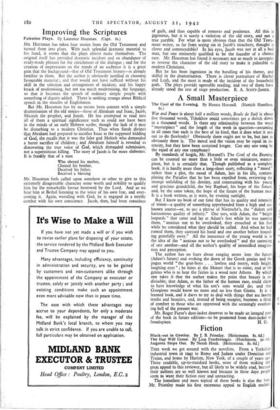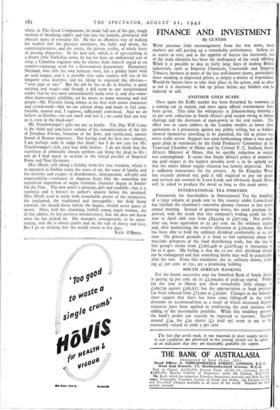Fiction
Black-out in Gretley. By J. B. Priestley. (Heinemann. 8s. 6d.) The Day Will Come. By Lion Feuchtwanger. (Hutchinson. gs. 6d.) Augusta Steps Out. By Norah Houk. (Heinemann. 8s. 6d.)
THIS week we get around with the novelists. From a Yorkshire industrial town in 1942 to Rome and Judaea under Domitian and Trajan, and home by Harlem, New York, of a couple of years ago. Three readable, up-to-standard books, none of them making anY great appeal to Lis reviewer, but all likely to be widely read, because their authors are so well known and because in these days people seem to want their fiction easy and unexacting.
The homeliest and most topical of these books is also the hest- Mr. Priestley made his first enormous appeal to English readers
when, in The Good Companions, he made full use of his gay, tough method of breathing oddity and vim into the homely, provincial and obscure types of everyday life. He has an effortless way of making his readers feel the physical attributes, the habit and idiom, the commonplaceness, and the entity, the private reality, of whole hosts of passing characters. In his new tale, which is of spy-catching in a dreary little Yorkshire town, he has for hero an embittered sort of chap, a Canadian engineer who by chance finds himself roped in on counter-espionage work for a Government department. Humphrey Neyland, who tells his own intricate story, has a golden heart with an acid tongue, and it is possible that some readers will tire of his frequent wise diatribes and his liking to expound the obvious- " over pipe or two." But the job he has to do in Gretley is quite exciting and tough—and though it did seem to one inexperienced reader that he was most extraordinarily lucky over it, and also some- what depressingly infallible, yet he meets so many amusing and real people—Mr. Priestley being always at his best with minor characters and crowd-work—that we are carried along and made to feel com- fortable, natural and, I suppose, sufficiently convinced. And we do believe in Gretley—we can smell and feel it ; we could find our way in it, even in the black-out!
Mr. Feuchtwanger's gifts are not so kindly. The Day Will Come is the third and conclusive volume of his romanticisation of the life of Josephus Flavius, historian of the Jews, and intellectual, uneasy friend of Roman emperors. Not having read the first two volumes, I am perhaps unfit to judge this third ; but I do not care for Mr. Feuchtwanger's rich, easy way with history. I do not think that the repetition of arbitrarily chosen epithets can bring the dead to life ; nor do I find much to acclaim in the forced parallel of Imperial Rome and Nazi Germany.
Miss Hoult, still taking a holiday from her true vocation, which is to interpret in Dublin terms the sense of sin, the sense of family, and the miseries and escapes of drunkenness, introspection, self-pity and respectability—continues in Augusta Steps Out the somewhat too superficial exposition of negro feminine character begun in Smilin' On the Vine. The new novel is pleasant, deft and readable—but it is synthetic and it betrays its author's anxiety before the invented. Miss Hoult used to write with remarkable power of the instinctive, the implanted, the traditional and inescapable ; her field being emotion, she should know before she begins, should never guess or invent. Here, with her charming, foolish young negro woman, she all but admits, by her perverse inventiveness, that she does not know what she has picked on. She manages, courageously, to be enter- taining, and she is always gentle and on the side of mercy and love. But I go on wishing that she would return to her pays.
KATE O'BRIEN.



























 Previous page
Previous page